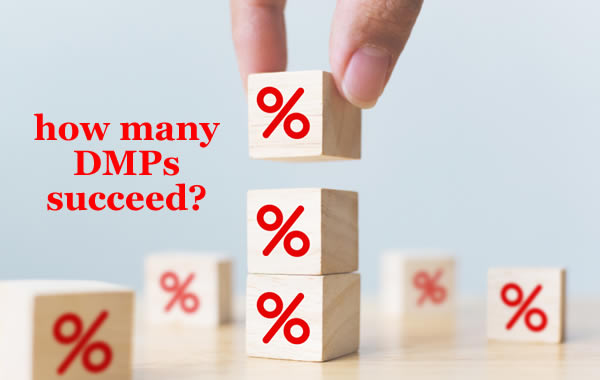If you are thinking about a Debt Management Plan (DMP), you may want to know how many DMPs succeed, and how many run into problems.
This turns out to be a surprisingly difficult question to answer!
A DMP that doesn’t repay all debts may not have failed!
There are many situations where a DMP that doesn’t “complete” has done exactly what it was wanted for. It is hard to see these as failures.
Sometimes the DMP was always intended to just be for a short time:
- you are made redundant but expect to find a new job in a few months;
- you need a DMP for 18 months until your childcare costs will drop a lot; or
- when the house is sold you will be able to clear most of your debts.
Sometimes someone’s situation is too complicated for it to be clear what the best long-term debt solution is:
- you are making affordability complaints – a DMP puts you in a safe financial situation while these go through. If a lot are upheld, your Mp will be speeded up a lot. If few are you may need to look at other debts options;
- if you are off work looking after a sick family member;
- you are 7 months pregnant, or
- you need to move within the next few months.
In all these situations, a very low-paying DMP can give you a break from worrying for six months or a year until things settle down.
Even if it would take 25 years to repay your debts in a DMP like this, it doesn’t matter because that isn’t what your DMP is for.
It isn’t going to carry on at that repayment level for many years.

Sometimes a DMP ends for other reasons
There may be a change in circumstances which means the DMP is no longer needed or no longer possible.
Perhaps a relative offers some money that lets you make a full and final settlement offer to some or all of your debts. Or you get some affordability refunds that reduce the debt total in your DMP a lot.
Here the DMP has worked really well for you even though it wasn’t the DMP as it was planned at the start that has repaid all your debts.
It can also be sensible not to rush into selling the house or going bankrupt.
Many people don’t feel ready to make such a final decision early on. After a year on a DMP they may have a better feel for what is going to be best for their family. If they are finding it quite easy to manage on a restricted budget, they may then be confident enough to commit to a five year IVA.
DMPs are not recorded
We know how many people go bankrupt, start an IVA or a DRO every year. There are statistics about the numbers of CCJs. But DMPs aren’t formal legal agreements and no-one is counting them.
The Financial Conduct Authority regulates firms that offer debt management plans. They could ask debt management firms to report DMP numbers.
But some people set up their own debt management plans by making arrangements to pay with all their creditors. This can work well for many people. See Is it a lot of work to run my own DMP? if you would like to know more about what you have to do. The FCA says lenders should treat these “DIY DMPs” in the same way as one run by a debt management firm. But no one can count these.
And what about the very large number of arrangements to pay made directly between a customer and their lenders? Some of these arrangements can be very short-term – a customer phones up a bank or a credit card to say that they can’t make the payment this month but will be able to repay the arrears next month. Should that ever be counted? Often there isn’t much difference between these and a DMP.
Without a list of how many DMPs and payment arrangements are set up, discussions about how many “fail” and how many “succeed” have to be largely anecdotal.
Very long DMPs are not good debt solutions
Although it’s not possible to answer the question How many DMPs succeed? it is useful to focus on the biggest problem with DMPs – that they can just take too long.
Sometimes people get stuck in a debt management plan which doesn’t go well. An example:
Mr G’s DMP was expected to last seven years at the start. But his income didn’t keep up inflation so at his annual reviews, his month DMP payments were reduced twice. His DMP now looks as though it will take at least ten more years to complete.
It makes sense to review your DMP at least once a year to check it is “on track”. If it isn’t, then have a look at your other debt alternatives.
Your DMP firm will discuss if it might be better to look at other options such as a Debt Relief Order. When the DRO criteria changed in summer 2021, some people on a low paying DMP became eligible for a DRO and could switch to one.
Almost all creditors will freeze new interest and stop adding charges in a DMP. If you are unlucky and one of yours doesn’t, you can challenge this – because getting that stopped could make a big difference. with the advent of the new Consumer Duty, it may be very hard for a creditor to justify a decision not to freeze interest and charges.
But there’s no point in thinking too much about this at the start:
- most creditors freeze interest if they are presented with a reasonable income & expenditure sheet.
- most people find a DMP removes a lot of the pressure on them.
If you are worrying about whether a DMP will succeed, perhaps because your situation may change or you are just too uncertain to choose other debt solutions, I suggest getting on with setting up a DMP and planning to review it in six months. You don’t have to wait for your DMP firm’s annual review.



Matthew Cheetham says
it all depends on the definition of success. As DMP’s are now under FCA regulation it is a very important question because for them, any product is about successful outcomes. In reality, the individual circumstances need to be considered so there is no easy answer. Generally DMP fees should be less than the interest charges and there are other added services and benefits. So even if is a DMP with > 5 years,then the consumer should be better off. There may be instances where a DMP is scheduled to last longer than 10 years but in reality, the consumer expects their situation to improve so it is never intended to run the full length.
Sara (Debt Camel) says
I agree, the definition of “success” is not simple. Of course it is always better to not pay any DMP fees at all, either by running your own DMP or by going to a charity such as StepChange.
Ellen warren says
Hi I have 2 defaults registered in my name I am in a dmp which started in 2006 two creditors have whacked on defaults in 2014 even though I have kept up to date with my dmp. They did not notify me of the defaults and I have written to them to ask for copies which they have refused to. My question is are they allowed to do this seems unfair I wasn’t notified or given the opportunity to resolve before landing on my equifax report.
Sara (Debt Camel) says
Hi Ellen,
are they allowed to put on a default without telling you? No, you should be given a chance to resolve the matter first. BUT your best course of action now is not to argue about whether you have been told about the default, but to point out the default date should have been back in 2006-7 … in which case it will already have dropped off your credit record. This article https://debtcamel.co.uk/debt-default-date/ explains how to do this.
Another BUT – and its a big one – your DMP seems to be going on for a very long time. You really should consider if you now have better debt options available to you! After so long you may be able to get quite low full & final settlements accepted for example.
Emma W says
Good Evening,
I have just been recommended to start a DMP with Step Change they are projecting that it will be complete in 2 years and 4 months I’m presuming this is only if ALL my creditors agree to freezing interest. I have the list of things I need to do but struggling to find a template letter to send to all creditors informing them I am entering into this and asking for their help and support by freezing interest and charges. Up to now I have managed (just) to make payments on the accounts each month and have not fallen more than a month behind with any of them. I have so many concerns and worries my main one been that creditors refuse the DMP and threaten to take me to court.
Any help or advice on what to write in a letter would be most appreciated x
Sara (Debt Camel) says
Hi Emma, yes the timescale will assume that all creditors freeze interest. If one or more of them doesn’t, it will take longer.
A template letter – well first of all, you could ask StepChange to set up your DMP – no fees for you and they deal with all your creditors! But if you would rather do it yourself, then there are two good choices. First the CABMoney system was developed by Citizens Advice by is operated entirely by you – you put in your creditor, income & expenditure details and it will calculate the offers to each creditor and generate the letters – more about this here: https://debtcamel.co.uk/more-than-1000-people-using-cabmoneys-free-dmp-facility/. Or you could do it the hard way by working out the offers yourself and then using the template letter here: https://www.nationaldebtline.org/EW/sampleletters/Pages/Pro-rata-offers-%28sole-name%29.aspx
What if creditors refuse your DMP? Well they won’t refuse to accept your money :) They may refuse to freeze interest, in which case the DMP will take longer. Your projected DMP is very short so it isn’t going to be incredibly long even if this happens. And you can also ask them to reconsider, see https://debtcamel.co.uk/creditor-wont-freeze-interest/.
Will they take you to court? That isn’t likely to happen because your DMP is so quick they will all be getting a reasonable amount of money each month.
If StepChange have recommended this DMP then it is your best option. If you can’t make the minimum monthly payments, no other debt solutions beat a quick DMP.
Emma says
Thank you so much, that has definitely helped me to feel much better about the whole situation, my debt is about £20.000 but I can afford £750 each month repayments obviously a debt consolidation loan would have been a better option for my credit score but no lender will touch me given what credit I already have.
VP says
Hi all. I am seeking a bit of advice. I am on DMP with Stepchange since 2016. I had about £120 left to pay to be debt free, but I messed up. It started with 2 credit cards. Then Clearscore showed me some loan offers and I ended up with £12k debt from 15 different lenders – all used for gambling. I am dealing with gambling addiction – clean for 6 weeks now, but I am aware, it’s longterm run. I’ve talked to Stepchange and they’ve added all my debts to existing plan, but some of the lenders keep contacting me every day about missed payments and it’s very frustrating. I want to pay back what I borrowed but interests are very high, so I am thinking to raise affordability complaints, just not sure if that’s not going to make everything just worse.
Sara (Debt Camel) says
If you have only recently had the extra borrowing added into your DMP, then it takes a while before lenders get their systems update – the hassle should stop.
£12k of debt from 15 lenders – did you use some of the lenders for several loans?
VP says
No, I have only one debt with each lender. 3 of them are higher amounts, 1)£5000, 2)3000, 3) 1500 and the rest are debt between £150-£600
Sara (Debt Camel) says
so the higher amounts, definitely complain.
Use the template here https://debtcamel.co.uk/refunds-large-high-cost-loans/ for loans
– template here https://debtcamel.co.uk/refunds-catalogue-credit-card/ for credit cards
– and here https://debtcamel.co.uk/get-refund-overdraft/ for overdrafts.
The smaller debts, if you just borrowed a single time from those lenders, you can complain but it may be hard to win those complaints.
Making these complaints should not complicate your DMP. A lender cannot say it won’t accept your DMP because you have made a complaint – that just doesn’t happen. But if you are worried, wait a month or two until the DMP has settled down and then complain.
VP says
Thank you for your response. I am not sure if there is any legal requirement what lenders need to check, as none of them checked my payslip or bank statement. I’ve completed expenditure form with each of them, but they weren’t accurate anyway, as I wouldn’t include my gambling expenses there
Sara (Debt Camel) says
The regulations say that a lender must make “proportionate” checks. If the loan is only small, they don’t have to look in details unless you have had several loans from them.
eg have 4 £250 loans from a payday lender and you may well get the last 1 or 2 refunded. Have the same 4 loans from 4 different lenders and you will probably not get any refund.
VP says
Thank you. I would like to ask one more question. Stepchange made proposals to creditors and one of them refused, saying I was already on DMP when I took a loan with them. They were very rude to me on phone, saying I was lying to them, not saying about gambling and I knew what I am doing when I took the loan with them etc. Also they requested 3months bank statements from me. Do I need to send it to them? As I dont want to share any sensitive information with this company anymore. What is the worst that can happen in case I will not do what they say? Stepchange will make a payments to them as proposed anyway.
Sara (Debt Camel) says
Sorry have you made an affordability complaint to this lender?
It is a good idea to send them your 3 months bank statements – that is the proof that the loan was not affordable.
if you don’t want to, fine, but it could be quicker if they see the statements and change their mind.
But you can just send your complaint straight to the Finacial Ombudsman, with the statements.
VP says
I am not sure the bank statement will proof anything, as at the time of taking the loan put I had gambling problems, so there is gambling transactions all the way through the statement. It would be affordable if it would be the only loan, but at the time of taking loan with this particular lender I was already on DMP (they never asked me if I am) and I had loans with other lenders, which I didnt mention on the pre approval questionnaire, I mentioned just 2 or 3 lender, but I am not 100% sure.
Sara (Debt Camel) says
The lender should have checked your credit record – if there were loans on there you didn’t mention (many people don’t mention payday loans as they expected them to be paid off soon) then the lender should have looked more closely.
The whole point of sending bank statements is to show you had gambling problems and so if the lender had looked closely they would not have given you the loan. See https://debtcamel.co.uk/gambling-refunds-loans-cards-overdrafts/ for more about gambling and affordability complaints.